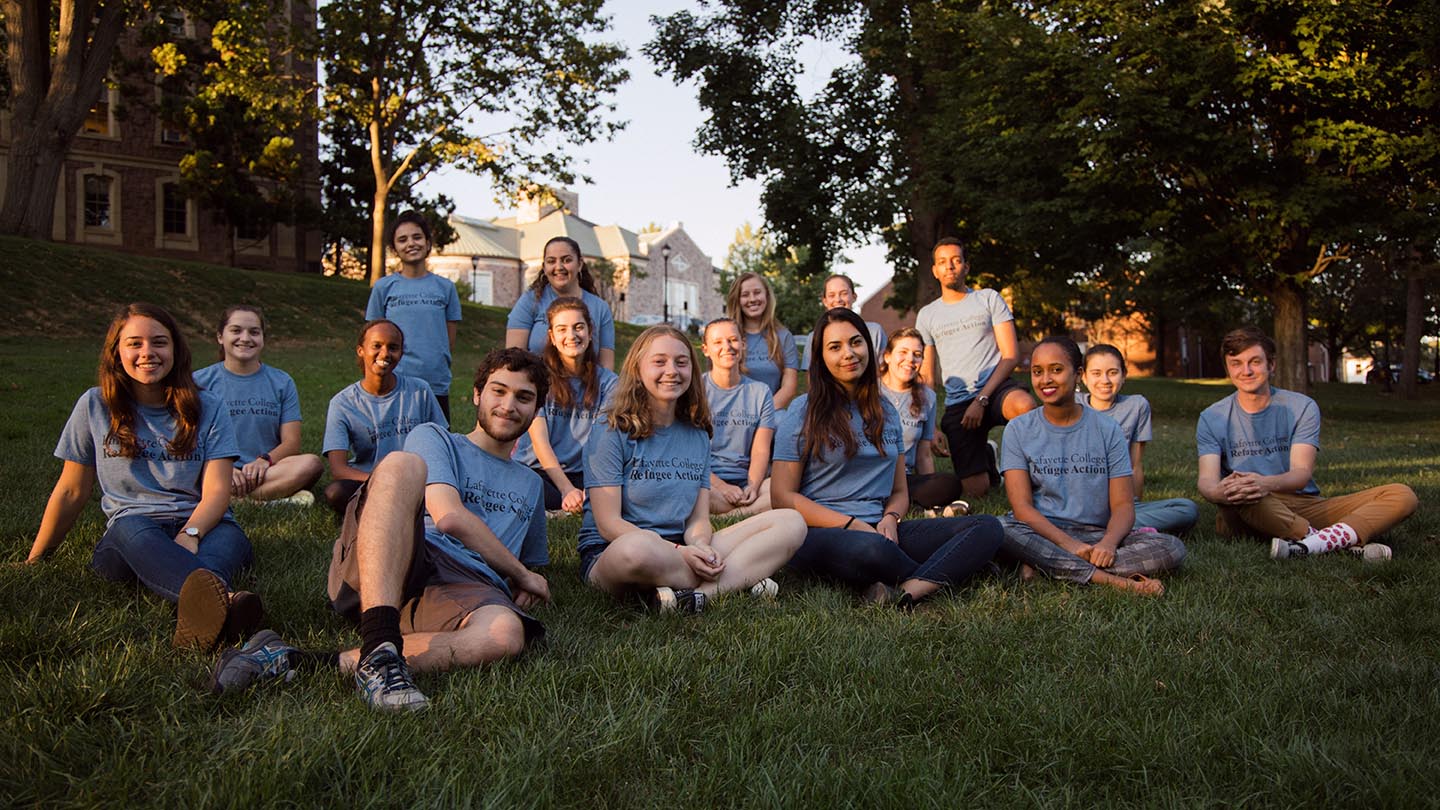A Place of Belonging
By Shannon Sigafoos
On a late winter day prior to the COVID-19 campus shutdown, Ayat Husseini ’20 held up her phone and shared a long list of logistical arrangements: A box truck arriving. Furniture being loaded onto it. That truck being driven to a home where someone coordinated having keys available. Everything being taken off the truck and into the house.
That was only phase one. The truck eventually had to return to where it came from, and students who spent all morning loading and unloading it eventually had to return to campus and to classes. From there, other students took over afternoon duties of getting the home’s new tenants—a refugee family brand-new to the Lehigh Valley—settled into the start of a whole new routine.

Members of Refugee Action gathered on campus (prior to COVID-19.) They are continuing to support families during the crisis while maintaining safe distancing.
Husseini is the president of resettlement for Refugee Action (RefAct), a student organization that seeks to provide ongoing support for local refugee resettlement agencies. With eight other students on the group’s leadership committee, time between classes was spent facilitating not only the resettlement process, but also how a refugee family moves forward—with jobs, language and education, health care, and everyday basic necessities.
Those needs have not changed during our social distancing period, though the network of helpers has had to coordinate their response efforts in new and careful ways that keep everyone involved safe.
“The organization started with fundraising to support the families and that was our way of giving resources, and then it turned into helping a little bit with paperwork, or maybe we could drive for a shopping trip,” shares Danielle Gardner ‘20, president of events and outreach. “From there, our club grew, and we took on a lot more to where the process is being totally run by students.”
The club initially worked with Bethany Christian Services (a branch of Lutheran Immigration Services) to assist with resettling a newly arrived refugee family. When Bethany began experiencing budget and staff cuts, the students decided to pick up more responsibilities—which meant reorganizing their own network to focus on both sponsorship and support. While raising and providing funds is a big piece of what they have to accomplish to keep the wheels turning, so, too, is the support piece.
Families who go through relocation face many complex legal, social justice, and psychosocial considerations. The goal is to provide them with a service connection to adjust to their new communities and to promote self-sufficiency. From the students’ side, the support piece can include anything from furnishing the home, to providing interpretation services, to helping the family make more local connections.
“Where events and outreach start to merge is that it’s not just about providing funds. It’s also about getting a sense of who we’re connected with in the community and how we can connect the family with the right people. It’s a lot like networking in that way,” says Husseini. “At this point, we’ve actually worked with about 10 families that have come into the Valley over the past year and a half to two years.”
When the campus shutdown began, the club had been in the midst of helping several families who had recently relocated, as well as another that has been established here for a while but is still in need of financial support. The group’s big public events—events where monetary donations are accepted to support resettlement efforts—have been canceled. These robust events had been intended to bring together not just Lafayette’s immediate community, but the larger community.
“A number of students continue to do the work needed to be done in Easton while minimizing their interactions with the families in an attempt to minimize their risk and that of the families,” Husseini recently shared. “A number of our students are still maintaining their roles remotely. Now more than ever, we need financial resources to help support these families and the support of others in the greater Lafayette community who are willing and able to donate their time to helping us out.”
How you can help Refugee Action now
The Refugee Action team wishes to extend its personal thanks to anyone who is able to help at this time. Those who have the ability to help should email Danielle Gardner. Their list of current needs, updated in April 2020, is below:
Employment
Refugee Action has two adults who are in need of employment that is easily accessible through public transportation from College Hill. Additional information on specific job skills is available to anyone interested.
Housing
Refugee Action is looking for housing to relocate a family from temporary housing to a more permanent location. Considerations include proximity to health care, schools, employment, and other necessities.
COVID-19 Responses
Refugee Action has implemented a few extra precautions to help its families and students stay healthy. All unnecessary contact with the families, such as fun visits and programming from the accommodations team, have been discontinued. They have stocked the cars responsible for medical appointment transportation with wipes and hand sanitizer and take extra care to create sanitary environments at all times while still supporting all medical needs. They have moved all tutoring online, providing resources to the families to continue schooling online when possible. The families are aware of the ongoing status of this situation and are receiving information about rent, loans and “shelter-in-place” orders that apply. The Refugee Action team has also had success in making sure this situation does not affect accessibility to food and other necessities.